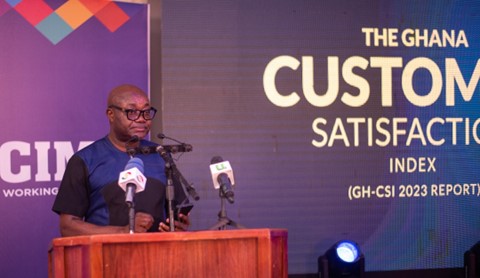By Ernest Bako WUBONTO
The third Ghana Customer Satisfaction Index (GH-CSI) report by the Chartered Institute of Marketing Ghana (CIMG) for the consumer banking sector has shown a slight drop year-on-year (Y\Y) from the rise in 2022.
The report, which was launched at the weekend in Accra, indicated that overall, 93 percent of customers expressed satisfaction with consumer banking services in all the parameters measured with 56 percent being extremely satisfied and 37 percent just satisfied.
On the flip side, one percent expressed being extremely dissatisfied, while two percent said they were just dissatisfied with the remaining five percent remaining neutral.
The study measured service quality, customer satisfaction and customer loyalty in both consumer banking and business banking to establish a standard customer satisfaction index. In terms of service quality, the six parameters used included tangibility of service, reliability, responsiveness, assurance, empathy and ease of use, and soliciting responses via online and face-to-face means.
Customer loyalty, one of the other measured indices also showed a significant drop year-on-year, recording a 74 percent performance against the 81 percent recorded in 2022.
However, customer satisfaction for business banking produced a slight increase from the second edition’s 93 percent to 94 percent for the year 2023.
The approved Ghana Customer Satisfaction Index, which was based on the average service quality score of the 5 topmost performing banks was 93.8 per cent for consumer banking and 94.8 per cent for business banking.
Individual banks’ performance
Based on this survey’s parameters, the star rating of individual banks is as follows: (91-100 percent) five-star; (81-90) four-star; (71-80) three-star; (51-70) two-star; and (0-50) one-star or poor service.
In terms of the individual bank’s performances, 14 banks were rated 5-star in customer satisfaction for consumer banking. The Best Bank in Customer Satisfaction award went to Prudential Bank Limited while Consolidated Bank Ghana Limited and OmniBSIC Bank Ghana Limited grabbed the second and third, respectively.
Only seven banks were rated 5-star in Service Quality for consumer banking. First Bank Ghana Limited was rated Best Bank in Service Quality. CalBank PLC and OmniBSIC Bank Ghana Limited placed second and third respectively.
In the business banking category, 17 banks were rated 5-star in Customer Satisfactory while another 17 recorded 5-Star in Service Quality.
National President of CIMG, Dr. D. Kasser Tee, indicated that this report is more than just a study of the state of the service quality levels in banking as experienced by individual and business customers of banks. It, indeed, reflects the voices, sentiments and trust of Ghanaians whose lives are impacted by the services offered by banks.
It is an important measure of how well the industry is meeting the needs and expectations of its most valuable asset, the customer.
“Notwithstanding that Ghana’s banking industry has undergone significant changes from regulatory reforms to the advancement and influence of technology and digital transformation, one thing has remained and will continue to remain constant – that is Customer Satisfaction, which is often derived from service quality, among other drivers. The report being outdoored tonight provides us with a unique opportunity to understand the evolving needs and expectations of customers while offering a benchmark for the institutions involved to assess their performance and take corrective measures for improvement,” he said.
He commended the banks for the heightened financial literacy education in the year under review, emphasising that with such prompt sensitisation messages and campaigns via different platforms, customers are protected against cybercrime and digital banking fraud.
The Guest speaker for the occasion, Dr. Kwasi Osei-Yeboah who is the Head of the Financial Stability Department of the Bank of Ghana said customers are pivotal to the banking industry’s existence.
It is therefore crucial to have mechanisms to receive feedback on their perception of service quality, satisfaction, and loyalty to their banks. As a regulator, the Bank of Ghana values reports that are based on extensive research such as the CIMG Ghana Customer Satisfaction Index, as it provides useful information that reflects market realities and sentiments from the perspective of customers.
He emphasized that “fair treatment of customers and product transparency associated with transactions engender consumer confidence, and these are essential pillars for sustainable growth of the banking industry. The Bank of Ghana has consistently prioritized customer protection and equitable treatment to promote financial system stability. By implementing regulatory frameworks and supervisory measures, we strive to ensure that all financial institutions uphold the highest ethical and fair standards in their relationships with customers.”
He entreated banks to implement comprehensive written procedures for managing consumer complaints, which include receipt, resolution, monitoring, and communication of outcomes both internally and also to the Bank of Ghana.
Each bank must have a dedicated unit in every branch, staffed by trained personnel to ensure complaints are handled courteously and impartially. They must ensure that consumers can lodge complaints directly at the service location or through designated channels, and each complaint must receive a unique registration number for traceability. Essential details about the complaint must be documented, ensuring equal treatment for all cases.
“Another area of focus for the Bank of Ghana is to empower consumers and foster a more financially educated and inclusive populace through financial literacy programmes. We have developed and implemented sensitization programmes, which we use various delivery channels to especially equip the most vulnerable groups in society. And I will like to stress that banks strengthen their respective financial literacy programmes and enhance products awareness.” Conluded Dr Osei-Yeboah.










